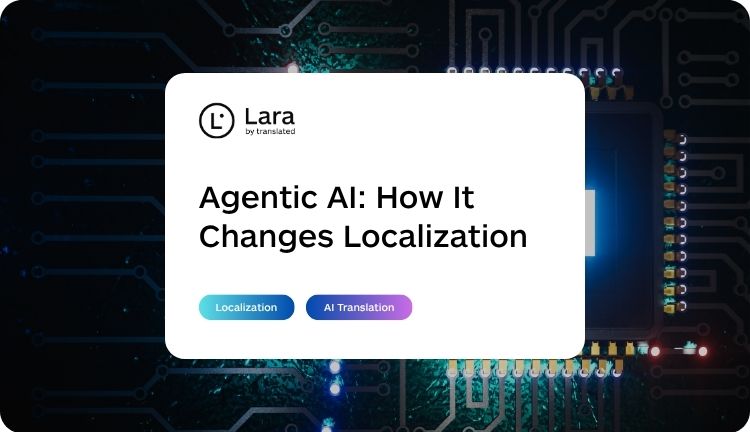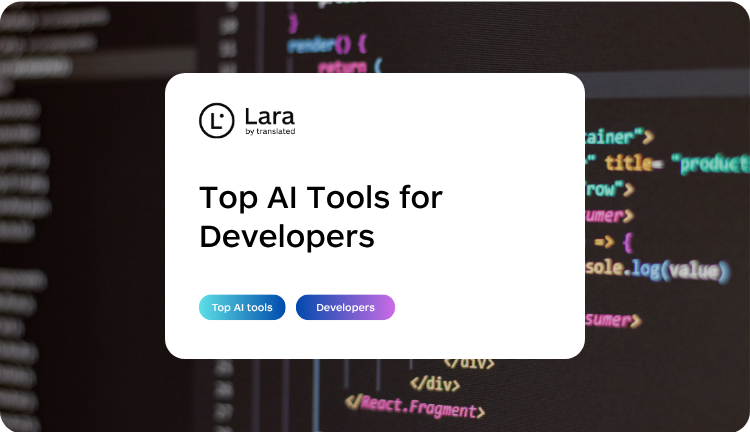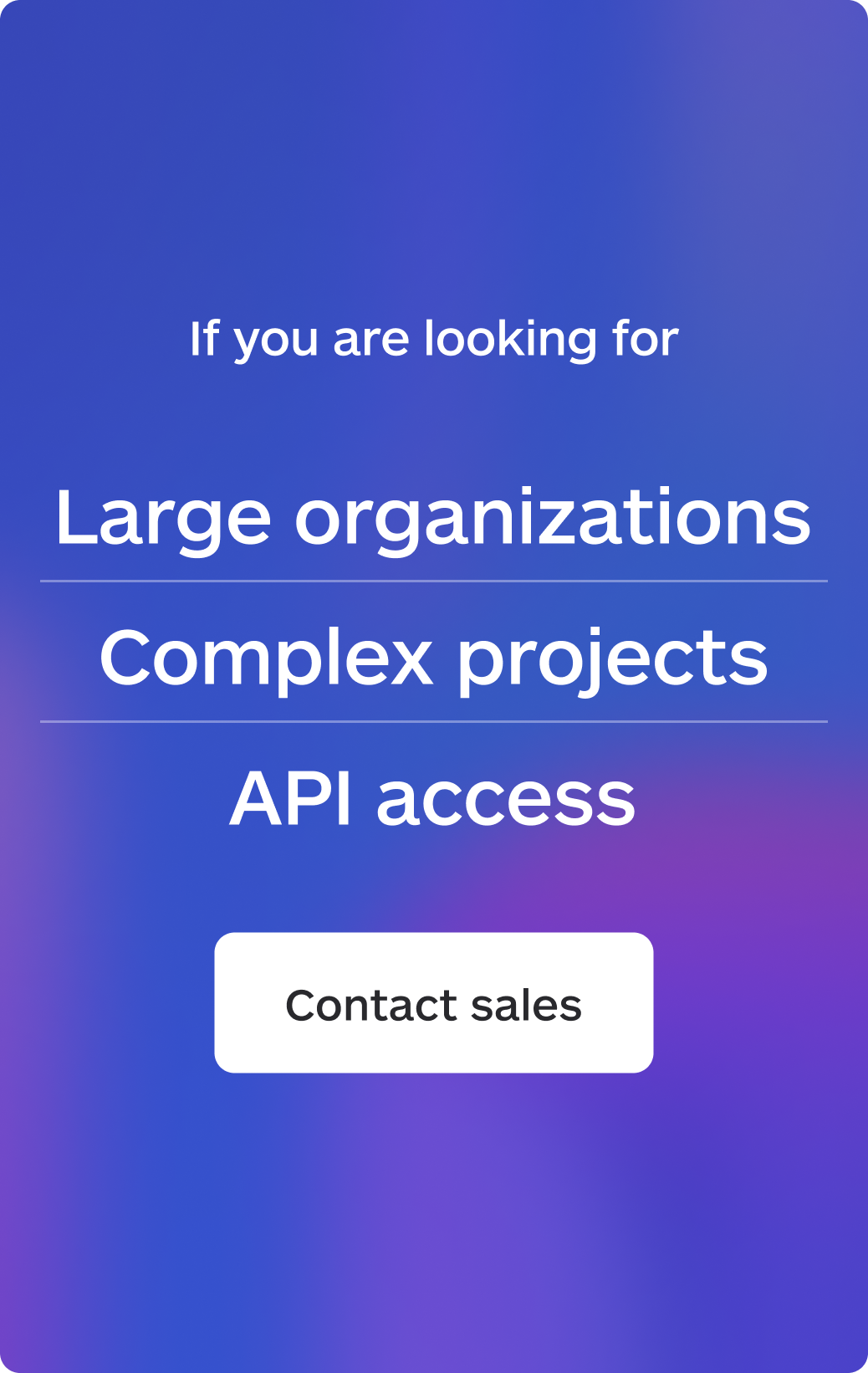Search engine optimization continues to evolve at breakneck speed, and the tools that worked last year might not cut it in 2025. With AI overviews taking up more SERP real estate and organic clicks becoming increasingly competitive, choosing the right and best SEO tools has never been more critical for digital success.
The landscape has shifted dramatically. Traditional keyword research methods are being challenged by sophisticated AI-powered analysis, while technical SEO requirements have become more complex. Whether you’re managing multiple sites, conducting competitor analysis, or optimizing content for global audiences, having the right toolkit can mean the difference between ranking on page one or getting lost in the shuffle.

After analyzing dozens of platforms and testing various combinations, we’ve identified the best SEO tools for 2025 that actually deliver results. These aren’t just feature-rich platforms that look impressive in demos – they’re proven solutions that help businesses drive real organic growth and maintain competitive advantages in an increasingly crowded digital marketplace.
Why choosing the right SEO tools matters in 2025
The SEO landscape has become more sophisticated and competitive than ever before. Google’s algorithm updates, the rise of AI-generated content, and changing user search behaviors have created new challenges that require more advanced tools and strategies.
Modern SEO success demands tools that can handle multiple dimensions simultaneously: technical optimization, content quality analysis, competitive intelligence, and performance tracking. The days of relying on basic keyword density checkers or simple rank trackers are long gone.
What makes 2025 particularly challenging is the need for tools that understand context, user intent, and semantic relationships. Search engines have become remarkably good at understanding what users actually want, which means your SEO tools need to be equally sophisticated to keep pace.
Essential SEO tool categories for 2025
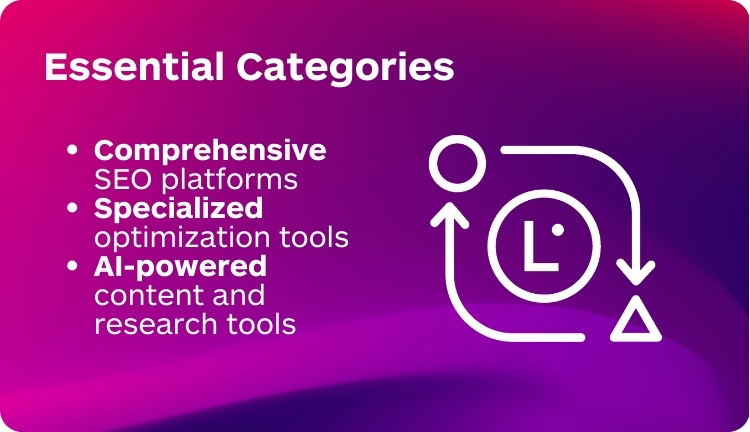
Comprehensive SEO platforms
All-in-one SEO platforms continue to dominate the professional landscape, offering integrated suites that handle everything from keyword research to technical audits. These platforms excel at providing centralized dashboards where teams can manage multiple aspects of their SEO campaigns without switching between different tools.
The leading platforms have evolved significantly, incorporating machine learning algorithms that can predict keyword opportunities, analyze competitor strategies with greater depth, and provide actionable recommendations based on massive datasets. What sets the best platforms apart is their ability to synthesize complex data into clear, actionable insights.
Specialized optimization tools
While comprehensive platforms handle broad SEO needs, specialized SEO tools often excel in specific areas. Content optimization tools use advanced algorithms to analyze top-ranking pages and provide specific recommendations for improving relevance and readability.
Technical SEO tools have become particularly sophisticated, offering detailed site audits that can identify issues ranging from Core Web Vitals problems to complex crawlability issues. These tools often provide more granular analysis than what’s available in all-in-one platforms.
AI-powered content and research tools
AI-powered SEO tools have revolutionized content creation and optimization workflows. These tools can analyze search intent with remarkable accuracy, suggest content structures based on top-performing pages, and even help identify emerging trends before they become competitive.
The most effective AI tools in SEO complement human expertise rather than replacing it. They excel at processing large datasets, identifying patterns, and generating initial content frameworks, but successful SEO still requires human insight for strategy, creativity, and quality control.
Top SEO tools for comprehensive analysis
Semrush: the versatile powerhouse
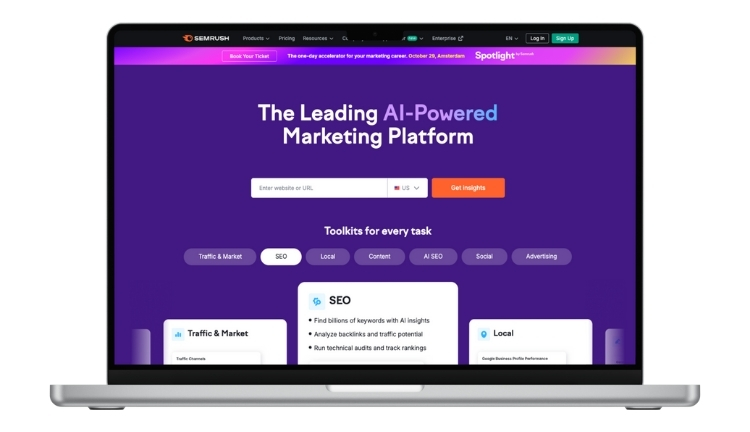
Semrush remains one of the most trusted names in SEO, offering an extensive suite of tools that handle virtually every aspect of search optimization. Its strength lies in competitor analysis, where it provides detailed insights into rival strategies across both organic and paid search campaigns.
The platform’s Domain Overview tool excels at revealing which keywords drive the most traffic to competitor sites, helping identify profitable opportunities. The advertising research capabilities are particularly valuable for understanding which keywords competitors consistently invest in – a strong indicator of commercial value.
What makes Semrush particularly effective for 2025 is its topic clustering capabilities, which help understand how competitors structure their content around keyword themes. This insight proves invaluable for developing comprehensive content strategies that target entire topic areas rather than isolated keywords.
Ahrefs: unmatched backlink intelligence
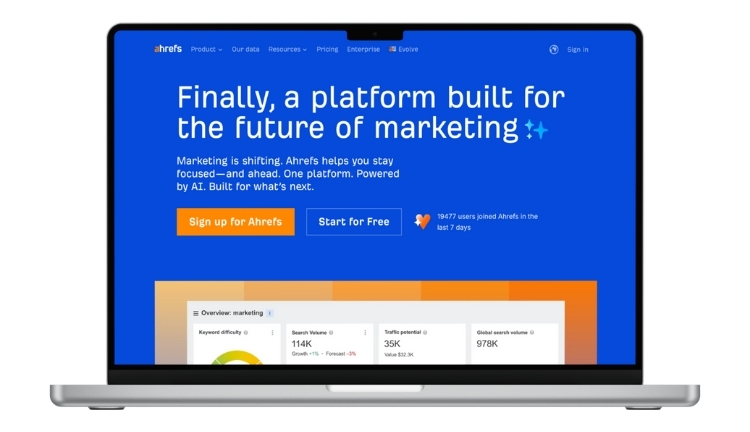
Ahrefs has built its reputation on providing the most comprehensive backlink analysis available. Its Content Gap tool stands out for competitive research, showing exactly which keywords competitors rank for that you don’t – revealing clear opportunities for content development.
The platform’s Site Explorer provides detailed insights into competitor backlink profiles, including the specific pages that earn the most links and the anchor text distributions. This intelligence proves crucial for developing effective link building strategies and understanding industry linking patterns.
For keyword research, Ahrefs offers reliable data with useful metrics like traffic potential, which estimates how much traffic a page could receive if it ranked #1 for target keywords. This helps prioritize content creation efforts based on realistic traffic projections.
Screaming Frog: technical SEO excellence
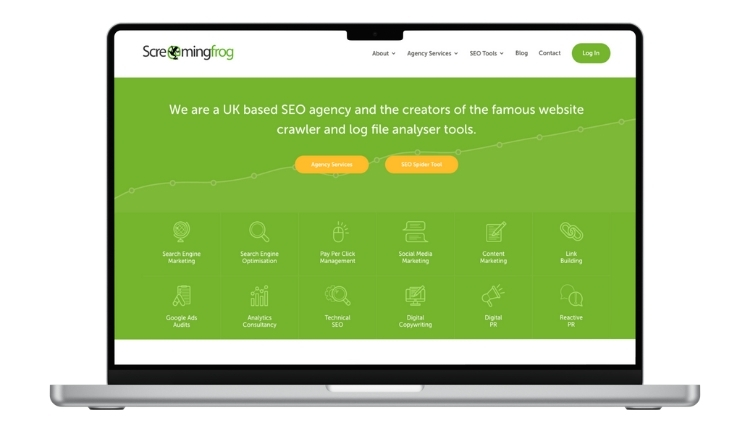
Screaming Frog SEO Spider remains the gold standard for technical SEO auditing. Its desktop application provides incredibly detailed site crawls that reveal everything from missing meta descriptions to complex redirect chains and duplicate content issues.
The tool’s strength lies in its customization options and API integrations. Connecting Google Analytics and Search Console data directly to crawl results provides a complete picture of how technical issues impact actual performance. This integration helps prioritize fixes based on pages that actually receive traffic.
The recently added AI integrations allow for automated generation of meta descriptions and alt text, though these features work best when combined with human oversight to ensure quality and brand consistency.
Specialized tools for content optimization
Content optimization platforms
Modern content optimization tools have evolved far beyond simple keyword density analysis. The best platforms now analyze semantic relationships, content structure, and user engagement signals to provide comprehensive optimization recommendations.
These tools excel at analyzing top-ranking pages for target keywords, identifying common content elements, and suggesting improvements based on what actually works in search results. They often provide real-time optimization scores and recommendations as content is being created.
The most effective content optimization tools also consider user intent analysis, helping ensure that content not only ranks well but actually satisfies searcher needs. This alignment between optimization and user satisfaction has become crucial as search engines become more sophisticated at measuring content quality.
Keyword research and trend analysis
Keyword research tools have become more sophisticated in understanding search behavior and predicting trends. The best tools now provide insights into keyword clustering, search intent classification, and seasonal trend analysis that goes beyond basic search volume data.
Modern keyword research emphasizes understanding the complete search landscape around topics rather than focusing on individual keywords. This approach aligns with how search engines increasingly understand and rank content based on topical authority and comprehensive coverage.
Trend analysis tools have become particularly valuable for identifying emerging opportunities before they become highly competitive. These tools can spot rising search interest and help content creators establish authority in growing topic areas.
AI and automation in SEO tools
The role of artificial intelligence
AI-powered SEO tools have transformed how professionals approach optimization tasks. Machine learning algorithms now power everything from keyword clustering to content generation, providing insights that would be impossible to achieve through manual analysis.
The most effective AI implementations in SEO focus on data processing and pattern recognition rather than replacing human judgment. AI excels at analyzing massive datasets, identifying correlations, and suggesting optimization opportunities that might otherwise be missed.
However, successful SEO professionals understand that AI tools work best when combined with human expertise. While AI can process data and suggest optimizations, human insight remains essential for strategy development, content quality control, and understanding business context.
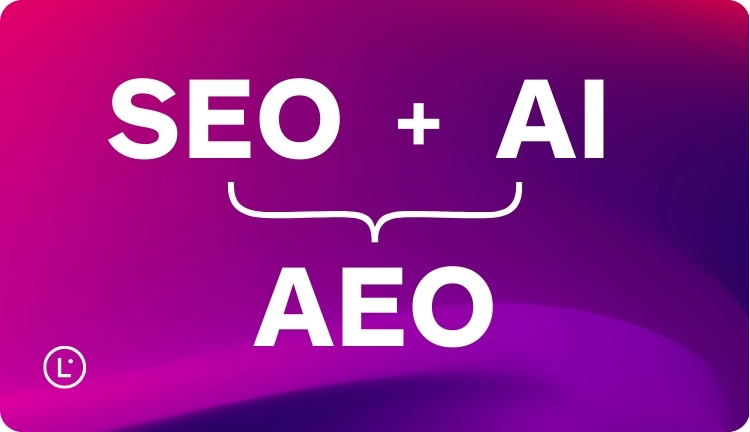
Answer Engine Optimization (AEO)
With the rise of AI-driven search engines and generative overviews, Answer Engine Optimization has become a critical extension of SEO strategy. Unlike traditional SEO, which focuses on ranking within search results, AEO is about shaping content so it can be selected, summarized, and served directly as an answer by AI models like ChatGPT, Gemini, or Perplexity.
This requires content that is clear, structured, and context-rich, with precise language and well-defined entities. For businesses, investing in AEO means ensuring that brand information is not just visible but authoritative in the new search landscape, where AI increasingly acts as the gatekeeper to user attention.
Automation best practices
SEO automation has become increasingly sophisticated, handling routine tasks like rank tracking, technical auditing, and report generation. The best automation implementations free up time for strategic work while maintaining accuracy and consistency.
Effective automation requires careful setup and ongoing monitoring. Automated alerts for ranking changes, technical issues, or competitor movements can help teams respond quickly to important developments. However, automation should complement rather than replace human analysis and decision-making.
The key to successful SEO automation lies in understanding which tasks benefit from automation and which require human judgment. Routine monitoring and data collection are ideal for automation, while strategy development and content creation still require human creativity and insight.
Translation and multilingual SEO considerations
Global SEO challenges
Managing SEO for multilingual websites presents unique challenges that require specialized tools and approaches. Different search engines dominate various regions, and keyword research must account for local search behaviors and cultural nuances.
Technical implementation becomes more complex with multilingual sites, requiring proper hreflang implementation, URL structure decisions, and content management across multiple languages. The wrong approach can lead to duplicate content issues or poor user experience for international visitors.
Translation quality directly impacts SEO performance in international markets. Poor translations can hurt user engagement metrics, while high-quality localized content helps build authority and trust with local audiences. This makes choosing the right translation technology crucial for global SEO success.
Lara Translate: advanced translation technology for multilingual SEO
When it comes to maintaining SEO performance across multiple languages, translation quality becomes a critical factor. Lara Translate leverages cutting-edge AI technology specifically designed for professional translation needs, offering speed and accuracy that traditional translation methods struggle to match.
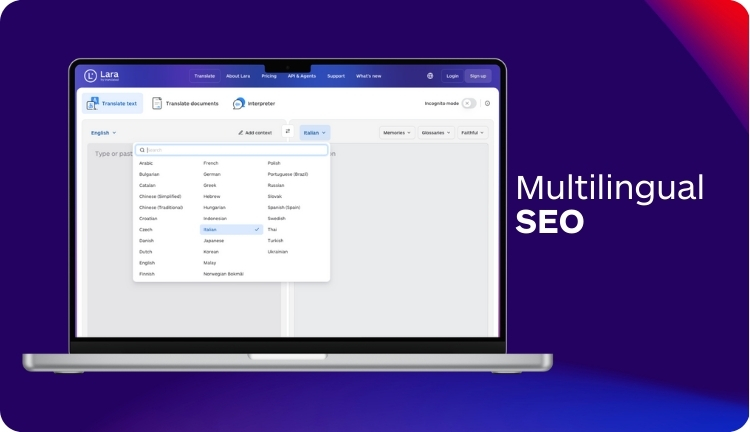
The platform supports many languages with remarkable efficiency, processing translations significantly faster than general-purpose language models. This speed advantage proves crucial for businesses managing large-scale multilingual content projects where time-to-market impacts competitive positioning.
What sets Lara Translate apart for multilingual SEO professionals is its focus on contextual accuracy and domain specificity. The system is trained on professionally reviewed documents, ensuring that technical terminology and industry-specific language are handled appropriately. For businesses expanding globally, this level of precision helps maintain brand voice and technical accuracy across all markets.
The integration capabilities through the Model Context Protocol (MCP) allow Lara Translate to work seamlessly with other business tools, streamlining workflows for teams managing multilingual SEO campaigns. This automation reduces the manual overhead typically associated with large-scale translation projects while maintaining the quality standards essential for effective international SEO.
Budget-friendly SEO tool alternatives
Free and low-cost options
Not every business needs enterprise-level SEO tools to achieve meaningful results. Several free and budget-friendly options provide substantial value for smaller operations or those just starting their SEO journey.
Google Search Console remains the most valuable free SEO tool available, providing direct insights from Google about site performance, indexing issues, and keyword rankings. When combined with Google Analytics, it offers a comprehensive foundation for SEO monitoring and optimization.
Browser extensions like SEOquake and MozBar provide quick insights while browsing competitor sites or analyzing search results. These tools offer convenient access to basic SEO metrics without requiring separate software installations or subscriptions.
Open source and community tools
The SEO community has developed numerous open source tools that provide professional-grade functionality without licensing costs. These tools often focus on specific SEO tasks and can be particularly valuable for agencies or consultants managing multiple client projects.
Community-driven tools benefit from continuous improvement and feature updates based on real-world usage. While they may require more technical setup than commercial alternatives, they often provide unique capabilities not available in mainstream tools.
Building a cost-effective toolkit
Creating an effective SEO toolkit on a budget requires strategic tool selection and creative combinations. The goal is covering essential SEO functions without redundant features or unnecessary complexity.
A basic but effective toolkit might combine free tools like Google Search Console and Google Analytics with one comprehensive paid platform and specialized tools for specific needs. This approach provides broad coverage while maintaining budget control.
The key is understanding which SEO functions are most critical for your specific situation and investing accordingly. Technical SEO tools might be crucial for large sites, while content optimization tools could be more valuable for content-focused businesses.
Measuring SEO tool effectiveness
Key performance indicators
Evaluating SEO tool performance requires clear metrics that align with business objectives. Rather than focusing solely on rankings, modern SEO measurement emphasizes organic traffic quality, conversion rates, and long-term visibility trends.
The most meaningful metrics often relate to business outcomes rather than purely SEO metrics. Organic traffic growth, lead generation, and revenue attribution provide clearer pictures of tool effectiveness than ranking positions alone.
Regular tool audits help ensure that your SEO software continues providing value as needs evolve. Tools that seemed essential initially might become less relevant as strategies mature or business focus shifts.
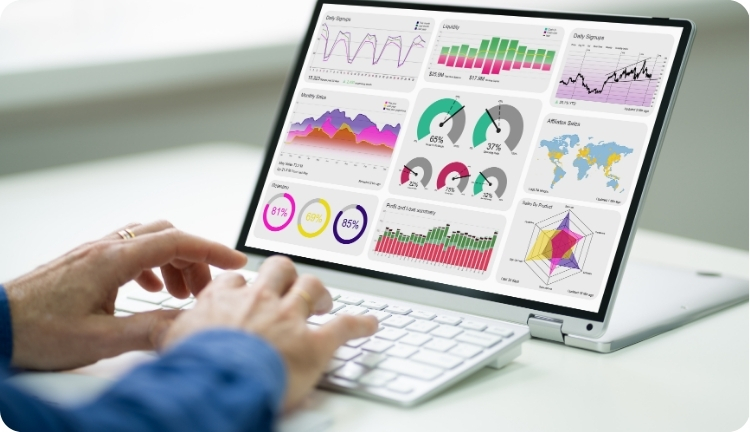
ROI calculation methods
Calculating return on investment for SEO tools requires understanding both direct costs and time savings. While subscription fees are obvious costs, the time efficiency gained through automation and better insights often provides the real value.
Effective ROI calculation considers both quantitative and qualitative benefits. Improved decision-making speed, better competitive intelligence, and reduced manual work all contribute to tool value even if they’re difficult to quantify precisely.
The best approach involves tracking specific outcomes attributable to tool usage, such as increased organic traffic from improved keyword targeting or time saved through automated reporting. These metrics provide concrete evidence of tool value.
Future trends in SEO tools
Emerging technologies
The future of SEO tools will likely be shaped by advances in artificial intelligence, machine learning, and real-time data processing. Predictive analytics will become more sophisticated, helping SEO professionals anticipate algorithm changes and market shifts.
Integration between different marketing tools will continue improving, creating more seamless workflows for teams managing multiple channels. API standardization and better data sharing will reduce the friction of using multiple specialized tools together.
Voice search optimization and visual search capabilities will become more prominent in SEO tools as these search methods gain popularity. Tools will need to adapt to analyze and optimize for these different search modalities.
Evolving search landscapes
As search engines become more sophisticated, SEO tools must evolve to match this complexity. Understanding user intent, semantic relationships, and content quality will require more advanced analysis capabilities.
The rise of AI-generated content presents both opportunities and challenges for SEO tools. Tools will need to help distinguish between helpful AI content and low-quality generated text while helping users create content that provides genuine value.
Privacy regulations and reduced data availability will push tools to find new ways of providing insights while respecting user privacy. This might involve more sophisticated modeling and inference techniques rather than direct data collection.
FAQs
What are the most important SEO tools for beginners?
For beginners, start with Google Search Console and Google Analytics as your foundation – they’re free and provide essential insights directly from Google. Add a comprehensive platform like Semrush or Ahrefs for keyword research and competitor analysis. Finally, include a technical audit tool like Screaming Frog to identify and fix website issues.
How much should I budget for SEO tools annually?
SEO tool budgets vary significantly based on business size and needs. Small businesses might spend $200-500 monthly on essential tools, while enterprise operations could invest $2,000-5,000+ monthly. Start with core tools and expand based on demonstrated ROI and growing needs.
Do I need multiple SEO tools or can one platform handle everything?
While all-in-one SEO platforms like Semrush or Ahrefs cover most needs, specialized tools often provide deeper insights in specific areas. A hybrid approach typically works best: one comprehensive platform for general needs plus specialized tools for areas like technical SEO, content optimization, or local search.
How often should I evaluate and change my SEO tools?
Review your SEO tool stack quarterly to ensure tools still meet your needs and provide good value. Major changes should happen annually unless tools significantly underperform or business needs change dramatically. Tool switching costs include learning curves and potential data loss, so changes should be strategic rather than impulsive.
Are free SEO tools sufficient for small businesses?
Free SEO tools can provide substantial value for small businesses, especially when combined strategically. Google’s free tools offer excellent foundations, and many browser extensions provide useful insights. However, paid tools often provide more comprehensive data, better automation, and time savings that justify their cost as businesses grow.
This article is about
- Best SEO tools for 2025 including comprehensive platforms, specialized optimization tools, and budget-friendly alternatives
- How to choose the right SEO software based on business needs, technical requirements, and budget constraints
- The role of AI-powered SEO tools in modern optimization workflows and their integration with human expertise
- Multilingual SEO considerations and how translation quality impacts international search performance
- Measuring SEO tool effectiveness through proper ROI calculation and performance monitoring
Have a valuable tool, resource, or insight that could enhance one of our articles? Submit your suggestion — we’ll be happy to review it and consider it for inclusion to enrich our content for our readers!



